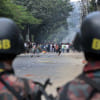How to fix the legacy of internet shutdowns in Bangladesh

Bangladesh endured a series of unprecedented state-sanctioned internet shutdowns during the month-long student protests, starting with restrictions on social media, messaging services, and mobile internet, and culminating in a near-total blackout that lasted five days. Although connectivity was temporarily restored, the final shutdown coincided with former Prime Minister Sheikh Hasina's resignation and departure on August 5.
A recent investigation under the interim government revealed that two government agencies, the National Telecommunication Monitoring Centre (NTMC) and the Bangladesh Telecommunication Regulatory Commission (BTRC), issued shutdown orders during student protests, under the direction of former state minister Zunaid Ahmed Palak, without any judicial or administrative approval. These top-down measures by the government to disconnect the internet is not new; the state has resorted to this brute force method of internet control on numerous occasions since 2009, with shutdowns occurring almost annually since 2015.
For over a decade, the UN Human Rights Council has condemned internet shutdowns and urged national governments to refrain from impeding internet access, reiterating that internet access is a human right and imploring governments to align domestic policies with international obligations on online freedom of expression. Although the Bangladesh Constitution does not explicitly mention internet access as a fundamental right, the constitutional guarantee of freedom of expression can be interpreted as conferring a right to uninterrupted internet access as essential for exercising this freedom.
Yet, over the last fifteen years, this extra-legal measure has been a favoured tactic of the former government to consolidate power, contain civil unrest and dissents, censor information, and isolate the country from the global community.
It is critical to understand the systemic legitimacy of shutdowns in Bangladesh. Under Bangladesh's Constitution, reasonable restrictions on freedom of expression may be imposed on certain grounds, inadvertently giving authorities the latitude to interpret the constitutional provisions to enforce internet shutdowns if necessary, for instance, for state security, public order, or public morality. Moreover, the broadly defined provisions of section 97 of the Bangladesh Telecommunication Regulation Act, 2001, coupled with vague and expansive licensing conditions, confers excessive discretion to authorities. This discretion has been abused to arbitrarily compel operators to restrict access, even though neither the regulatory agencies nor the overseeing ministries have a clear legal mandate to order such shutdowns.
Additionally, section 144 of the Code of Criminal Procedure, 1898 grants authorities sweeping powers to issue internet shutdown orders based on subjective assessments of potential threats to public order. On a systemic level, the structuring of telecommunications infrastructure at the network access level—where operators are required by licensing conditions to maintain connections with and provide data access to intelligence services like the NTMC under strict conditions of secrecy—enables state agencies to monitor, intercept, and restrict internet traffic, bypassing procedural and legal safeguards, contributing to a pervasive lack of transparency and accountability.
Constitutional principles demand that laws affecting individual freedoms be reasonably certain and predictable. Where discretionary powers are conferred upon state actors, they must be exercised within predefined limits and in a manner that is fair, reasonable, predictable, non-capricious, non-discriminatory, and non-arbitrary. It is clear that these principles were not adhered to by the former government or the agencies directing the shutdowns.
Addressing the issue of internet shutdowns and responding to national and international calls for their outright ban requires a significant and time-consuming policy overhaul. However, the entrenched nature of existing practices, coupled with a lack of immediate political will and the need for consultation and consensus-building among stakeholders, makes achieving these reforms challenging in the short term. A poorly conceived framework could result in future governments enforcing shutdowns, either through statutory amendments, or invocation of constitutional allowances, effectively bypassing the ban.
It would be remiss to overlook the complicity of other stakeholders, including civil society, courts, regulatory agencies, and the telecommunication operators Assessing their roles is paramount not only due to the unconstitutional nature of shutdown orders but also to put into perspective the human cost and economic setbacks that resulted from the wilful blindness.
Both the High Court Division and the Appellate Division of the Supreme Court of Bangladesh have the authority to assess constitutionality of laws and administrative actions, and, historically, have been proactive in legal reforms through suo motu rulings, extraordinary jurisdictions, guidelines, and seminal decisions. Yet there has been no judicial intervention against a repressive measure like an internet shutdown that repeatedly violated fundamental rights.
Government instrumentalisation of the BTRC, an independent statutory agency, to enforce shutdown orders were often verbally communicated to the operators, with no paper trail, allowing plausible deniability. In absence of explicit authority over shutdown decisions, the BTRC relied on ambiguous statutory provisions and licensing conditions.
Further compounding the issue is the authorities' denial of involvement in internet shutdowns, exposing operators to legal risks under section 67 of the Bangladesh Telecommunication Regulation Act, 2001, which criminalises unlawful obstructions to telecommunication and internet services. Considered thus, operators could have refused compliance and challenged legality of shutdown orders. It triggers the question on why the operators, especially subsidiaries of multinational corporations that are subject to international standards and scrutiny—collectively servicing around 96 percent of the country's mobile connections—maintained over-compliance with unlawful orders for over a decade.
Similarly, civil society organisations could have contested the legality of the restrictions under Article 102 of the constitution for infringing fundamental rights, particularly freedom of expression and right to equality and equal protection of law. Despite regular public interest litigations, no constitutional lawsuit has addressed these shutdowns till date.
The interim government has the opportunity to correct the course, and establish a forward-looking and future-proof legal framework to prevent internet shutdowns.
Both in principle and in practice, internet shutdowns should be de facto unlawful and unacceptable. A wholesale internet blackout has historically been used to impose collective punishment, censor speech and information, or suppress legitimate political protests. These measures have disproportionately impacted underrepresented communities, small businesses, and created an information vacuum.
While an outright ban on internet shutdowns would be the ideal solution, the necessary constitutional and legislative reforms makes it unlikely for an outright ban to be effectively implemented in the short term, and risks being overturned by future political regimes.
Considering the constraint of rule-making powers of the interim government, either a presidential ordinance or secondary legislation under the Bangladesh Telecommunication Regulation Act, 2001 could provide a viable path forward.
Consistent with the recommendations by the UN Human Rights Council and Bangladesh's Constitution, and in absence of a systemic overhaul, a primary or secondary legislation addressing disabling or throttling of internet connection and online services should consider the following normative standards and procedural safeguards: i) the law should define measures constituting internet shutdowns and specifically prohibit such measures, unless the conditions of the statute are met; ii) the law should explicitly give a specific state agency the power to enforce shutdown, with clear guidelines and standards to prevent misuse of that power; iii) any restrictions must be necessary to achieve the goals listed in Article 39(2) of the constitution; iv) a restriction must be reasonable and the least invasive method possible, and adequately reasoned. Orders should be as narrow as possible in terms of how long they last, the areas they cover, and the services they affect; v) decisions should be well-documented, with clear reasons provided. Those affected, including individuals and operators, should be informed in advance, with an explanation of the legal reasons and details of the shutdown's scope and duration; vi) all information about the decisions should be published according to the Right to Information Act, 2009 and other legal requirements; vii) the actions should be approved in advance by a court or an independent body to prevent political, commercial and other improper influence; vii) there should be timely ways for those affected to challenge the actions in court or through other means, even after the shutdown ends, and hold the state apparatuses accountable.
Considering the extensive use of shutdowns during the recent student protests and probable arguments around necessity to prevent violence, it may be prudent to seek an advisory opinion of the apex court on the legality of shutdown orders. This could provide critical insights into structuring an enactment that ensures a rights-respecting and principled legal framework. Albeit a less preferable option, the writ jurisdiction of the High Court Division could also be invoked to achieve the same outcome.
Given that fundamental rights are the default and restrictions are exceptions, internet shutdowns are, by nature, unlawful. Even in scenarios where shutdowns may be warranted, it should be temporary and targeted, and the measures must meet these stringent legal standards, ensuring adherence to established rights-respecting frameworks.
Shahzeb Mahmood is the Head of Legal and Policy Research at Tech Global Institute.
Views expressed in this article are the author's own.
Follow The Daily Star Opinion on Facebook for the latest opinions, commentaries and analyses by experts and professionals. To contribute your article or letter to The Daily Star Opinion, see our guidelines for submission.

 For all latest news, follow The Daily Star's Google News channel.
For all latest news, follow The Daily Star's Google News channel. 









Comments